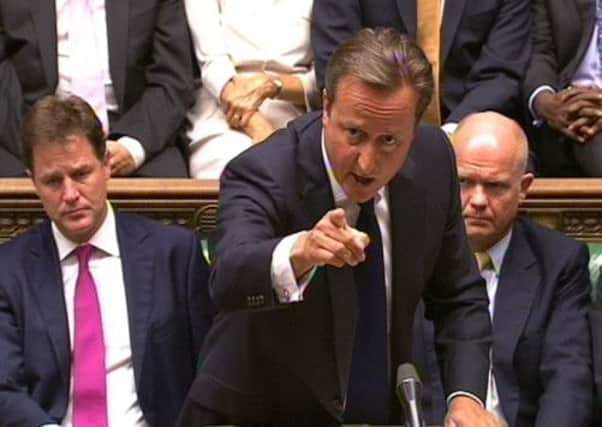Grant Woodward: Ghost at the feast haunts Cameron as opponents win the Syrian war of words


The fact that both the public mood and a sizeable chunk of political opinion was ranged against him forced David Cameron into a climbdown that turned yesterday’s debate in Parliament into the most important test of his premiership yet.
His speech to the Commons was both heartfelt and impassioned. Yet he was hamstrung in his bid to establish a cast-iron case for an early military strike against Bashar Assad’s regime by the sketchy evidence at his disposal.
Advertisement
Hide AdAdvertisement
Hide AdIt may not have been up there with the dodgy dossier that plunged us into a disastrous eight-year occupation of Iraq, but the document published yesterday by the Joint Intelligence Committee would not have swayed a single doubter.
Largely an analysis of so-called “open source material”, in other words camera phone videos posted on YouTube of last week’s chemical weapons attack, it concluded that it was “highly likely” that Assad was responsible. Crucially, however, it admitted that it could not fathom why his regime would carry out such an attack at such a time.
Ultimately, though, the biggest hurdle in David Cameron’s way was the overpowering sense of déjà vu that hovered over proceedings. On a March day 10 years ago, Tony Blair gave the performance of his political life to present a convincing argument for intervention in Iraq, quelling a potential Labour rebellion and securing a large majority – despite the absence of a UN resolution.
Cameron wasn’t quite that good yesterday. The pervading scepticism didn’t allow him to be, as he himself admitted when he accepted that “the well of public opinion was poisoned by the Iraq episode”. He implored MPs that this should not lead to paralysis when it came to taking action. Perhaps not, but it should certainly give rise to caution.
Advertisement
Hide AdAdvertisement
Hide AdFor all the Prime Minister’s earnest and laudable desire to do the right thing, his case lacked the absolute clarity that was needed to not only establish an unimpeachable justification for a military strike but to win over a deeply sceptical and war-weary public. He admitted there was no smoking gun – and despite now waiting for their findings it’s uncertain if UN weapons inspectors will find one. Instead he argued that Britain simply cannot stand by and do nothing while such atrocities are taking place. This, he said, was a “judgment call”.
In effect, the Prime Minister was asking us to trust him on this one.
Yet Iraq remained the ghost at the banquet. While no one who has seen the harrowing images of rows of dead women and children in Damascus could fail to agree with his condemnation of such an abhorrent attack, it was still no clearer what form effective intervention could take without sucking us further into this desperately bitter conflict. Aware of public concerns over such an entanglement, Cameron was keen to separate the issue in people’s minds. “This is not about taking sides, invading, regime change or working more closely with the opposition,” he said. “This is about the use of chemical weapons and our response to a war crime, nothing more.”
But can involvement in the Middle East ever be that straightforward? All these questions and more swirled around the Commons yesterday – and few of them were answered with any great certainty.
Advertisement
Hide AdAdvertisement
Hide AdThe trouble, once again, was that we had heard it all before. Tony Blair spoke too of the “moral” urgency to intervene in Iraq, only for public support to collapse amid nearly nine years of bloody fighting which continues despite the withdrawal of US and British troops. And just as the Labour leader failed to secure a UN resolution authorising action in Iraq, so doubts must still exist over the legality of intervention in Syria, despite the Government’s insistence that ruler Bashar Assad has breached the 1993 Chemical Weapons Convention which bans them, meaning action is justified.
There are parallels here with Kosovo in 1999, when the Western powers watched in horror as innocent people were killed. In that instance, Nato launched a bombing campaign without a UN sanction. Yet international law has changed since then, and states that such action can no longer be justified on the basis of overwhelming humanitarian need without a UN resolution, something David Cameron knows only too well that Russia and China will veto.
Despite this, both he and Ed Miliband agreed that it should not necessarily mean a military response is ruled out. But how far should it go? A 48-hour bombardment of key regime targets using cruise missiles fired from outside Syria would be the most likely course of action, but Iraq and Afghanistan have demonstrated the dangers of mission creep. How could we be sure it wouldn’t happen again? It wouldn’t, said the Prime Minister. And once again we were just going to have to trust him.
Throughout yesterday’s debate there was the sense that until Downing Street was forced to soften its position an attack featuring British involvement had been lined up and ready to go, possibly as early as this weekend. Keen to flex US muscles in the face of North Korean posturing, Barack Obama may now choose to go it alone for the time being.
Advertisement
Hide AdAdvertisement
Hide AdFor David Cameron, the events of the past 48 hours have delivered something of a bloody nose. Perhaps it is for the best. The key question must be whether intervention in Syria will leave that country any better off – and our own national security enhanced. Recent history tells us that both outcomes are unlikely.